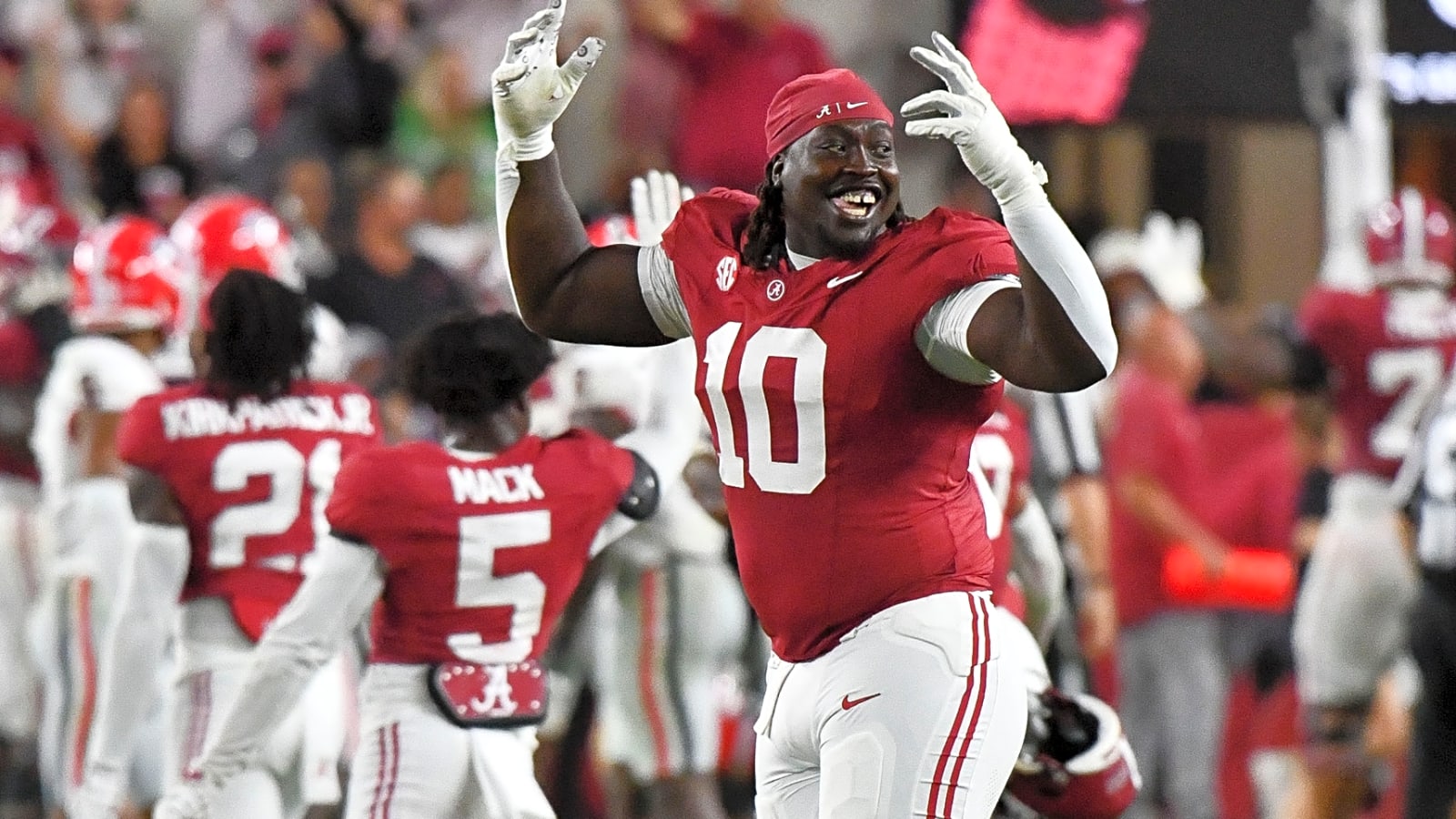Jehiem Oatis arrived at Alabama as a highly touted recruit in the Class of 2022, evaluated as one of the top-75 players nationwide. His size was undeniable—around 370 pounds—but what stood out more was the raw athleticism that accompanied his frame (bamahammer.com). In the iron‑willed environment of Nick Saban’s program, Oatis devoted himself to improving fitness and technique. His freshman year was promising: he dropped weight, earned reps, and racked up ten starts, earning freshman All‑SEC honors (si.com).
The second season followed a similar trajectory. Oatis appeared in thirteen games and logged three starts, posting solid numbers: 55 tackles, including three for loss, 1.5 sacks, and four pass breakups across a total of 25 games in his career thus far (si.com). For a young defensive tackle, that was a strong résumé, especially given his stature and potential.
Then came a turning point. In late 2023, Alabama’s longtime head coach Nick Saban announced his retirement. The program tapped Kalen DeBoer and defensive coordinator Kane Wommack, both of whom brought a new defensive scheme—Kane’s 3‑3‑5. This was a significant shift, favoring more nimble, lighter defenders rather than the classic massive nose tackles like Oatis, the kind Saban’s defenses often featured (bamahammer.com).
Early in the 2024 season, the change began to affect Oatis’s role. Emerging injuries, combined with a defensive structure that didn’t seem to accommodate his build, slashed his snaps dramatically. Where he once frequently saw over 22 snaps a game, now his opportunities dwindled: only 25 total snaps across four games, roughly 16 snaps per outing (espn.com). Georgia and Wisconsin games saw him on the field, but far less than expected, and he even redshirted in one game due to a knee issue and to preserve eligibility (espn.com).
In early October 2024, Oatis made a decisive move: he informed Alabama he would redshirt the rest of the season and enter the NCAA transfer portal (espn.com). As he put it, “Getting the reps and looks that I’m getting, I feel like it’s better for me to move on somewhere new” (espn.com). It wasn’t the departure of blood, sweat, and tears that fueled him—it was the scarcity of playing time in his junior year.
Fast forward to late June 2025: Oatis had chosen to transfer to Colorado under coach Deion Sanders. In a revealing conversation with Pete Nakos of On3 (with a full interview behind a subscription), Oatis reflected on the journey and didn’t mince his words: “I left Alabama because I came in with coach Saban, I took it to heart. That was one of my biggest dreams: To play in college football for coach Saban and win a ring … The new staff wasn’t for me. And once I found out that they didn’t mess with me, I knew it was time to get up and get out of there” (si.com).
There’s much to unpack in that line: “they didn’t mess with me.” It conjures feelings of neglect and disillusionment. Oatis didn’t shy away—he spoke publicly. BamaHammer, a fan‑centered site, noted that he “accused the staff of ‘messing him over’” (bamahammer.com), while Sports Illustrated highlighted his sense of personal disconnect from the new regime .
There’s no denying the weight such words carry. Oatis wasn’t just frustrated with his diminished role; he felt the new coaching staff didn’t see or support his talents. It strikes at the heart of athlete‑coach trust—when a player feels sidelined not by injury or lack of skill, but by shifted priorities and philosophy, it can break that bond.
On the other hand, the coaching staff and analysts offered context. Alabama’s new defensive scheme, particularly Wommack’s 3‑3‑5, emphasized speed, agility, and different defensive linemen body types—a far cry from the traditional nose guard role Oatis had occupied (bamahammer.com). Additionally, injuries in the offseason—surgeries on his shoulder, knee, and ankle—also limited his effectiveness in the spring (espn.com). Defensive coordinator Wommack noted that while Oatis had talent and uneven reps, their concern was that he “had not been able to perform or produce the way any of us would like” (espn.com).
Still, the cold stats speak volumes. Over 24 possessions that spanned four games in 2024, two tackles, one deflection, and noticeably reduced snaps underlined his diminishing presence on the field . Compare that to freshman and sophomore seasons, where he averaged 24 and 22 snaps, respectively . The contrast was stark.
Entering Colorado, Oatis will embrace a fresh opportunity. The Buffaloes under Coach Prime are building momentum not just for wins but for cultural transformation. Oatis, a 6‑5, 320‑pound interior lineman, will seek to reclaim his identity—both on the field and in his football narrative. He’ll also enter a different NIL landscape: Colorado sits 47th in collective student-athlete NIL compensation at $5.3M annually, compared to Alabama’s towering $15.9M (reddit.com, si.com). But for him, this isn’t a money move; it’s a matter of fit and belonging.
Now, nearly nine months after his October exit and ahead of the 2025 season opener on August 29 versus Georgia Tech, Oatis is exposing layers of his thought process and intensity that fueled this decision (si.com). This is his declaration: alignment matters. Philosophy matters. Fit matters. It wasn’t that Alabama no longer needed him—it’s that the Alabama they were being wasn’t the Alabama he signed up for.
In sharing his story, Oatis has touched on broader themes that resonate beyond one athlete or team. The culture shift from Saban to DeBoer mirrors what many programs face: transitions in leadership that redefine identity. Some players thrive in a new environment; others feel displaced. Oatis embodies the latter. His quotes—especially “they weren’t giving me playing time, that was a big part of why I left”—owe to his own dug‑in expectations: playing time is the currency of college football dreams, not just for personal glory but for NFL trajectories.
At the same time, the decision to leave and speak openly can brandish risks—labeled as “sour grapes” or lacking the humility programs expect. Indeed, BamaHammer commented that his words “reek of sour grapes from a player who wasn’t good enough to get on the field” (bamahammer.com). But the flip side is this: athletes are human. They prep, plan, sacrifice, envision themselves on the field. When those visions are undermined by schemes misaligned or staff miscommunication, the result is genuine hurt and frustration.
As Oatis embarks on Phase 2 of his college career, the stakes are clear: perform at Colorado, reestablish credibility, and claim that path to the NFL he’s long intended. He’ll need health, consistency, and coaches who both challenge and champion him. From his freshman season at Saban’s Alabama to now, it has been a journey carved by personal effort, community scrutiny, and shifting team identity.
There’s power in walking away, then articulating why. His statement—what might have stayed private—is now front and center: “they didn’t mess with me.” That hurt lingers in every word. Playing time isn’t just minutes on the field; it’s recognition that an athlete belongs, that their skills are valued, that their commitment is rewarded.
In telling his story, Oatis reminds us that college football isn’t just formation and numbers—it’s emotion, loyalty, disappointment, hope, and reinvention. He leaves Alabama with accolades earned and talent developed, but also with a chip on his shoulder, striving for redemption in Boulder. Those words—short, revealing—seek to correct course: “they weren’t giving me playing time, that was a big part of why I left.” Whether that becomes a call to action or a cautionary tale will depend on how he answers it on Saturday nights in the Rocky Mountains.



